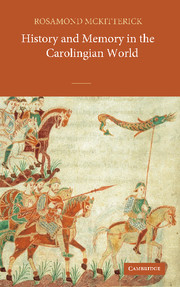Book contents
- Frontmatter
- Contents
- Preface
- Acknowledgements
- List of abbreviations
- 1 Introduction: History and memory in the Carolingian world
- 2 Carolingian history books
- 3 Paul the Deacon's Historia langobardorum and the Franks
- 4 The Carolingians on their past
- 5 Politics and history
- 6 Kingship and the writing of history
- 7 Social memory, commemoration and the book
- 8 History and memory in early medieval Bavaria
- 9 The reading of history at Lorsch and St Amand
- 10 Texts, authority and the history of the church
- 11 Christianity as history
- 12 Conclusion: History and its audiences in the Carolingian world
- Bibliography
- Index of manuscripts
- General index
10 - Texts, authority and the history of the church
Published online by Cambridge University Press: 15 December 2009
- Frontmatter
- Contents
- Preface
- Acknowledgements
- List of abbreviations
- 1 Introduction: History and memory in the Carolingian world
- 2 Carolingian history books
- 3 Paul the Deacon's Historia langobardorum and the Franks
- 4 The Carolingians on their past
- 5 Politics and history
- 6 Kingship and the writing of history
- 7 Social memory, commemoration and the book
- 8 History and memory in early medieval Bavaria
- 9 The reading of history at Lorsch and St Amand
- 10 Texts, authority and the history of the church
- 11 Christianity as history
- 12 Conclusion: History and its audiences in the Carolingian world
- Bibliography
- Index of manuscripts
- General index
Summary
In 849, Gottschalk of Orbais in the diocese of Soissons was summoned to the Synod of Quierzy. From his own studies of the patristic theologians he had formed views on predestination that had found little favour with the established church of his day. No text of the proceedings at Quierzy survives, but we do have reports from eye witnesses in the contemporary Annals of St Bertin – interpolated by Archbishop Hincmar of Rheims to Gottschalk's disadvantage – and by Florus the Deacon of Lyons. Hincmar is very scathing on how much Gottschalk's learning had led him astray; he was too erudite for his own good. Hincmar tells us that at the synod, Gottschalk was accused of errant views, condemned, flogged and compelled to burn the books containing his statements (librosque suarum adsertionum). Florus the Deacon, however, provides crucial extra information. While Hincmar gave us the impression that Gottschalk went to Quierzy more or less to be publicly punished, Florus' account suggests that Gottschalk, at least as far as he, Gottschalk, was concerned, went to engage in dispute. He may even have been buoyed up with the hope of convincing his audience of bishops and abbots from the ecclesiastical province of Rheims, including Paschasius Radbertus of Corbie and Gottschalk's own abbot from Orbais, that he was justified in his views. Florus tells us that what Gottschalk had to burn were the sections from the Bible and patristic writings that vindicated his opinions and that he had brought with him to the synod.
- Type
- Chapter
- Information
- History and Memory in the Carolingian World , pp. 218 - 244Publisher: Cambridge University PressPrint publication year: 2004



